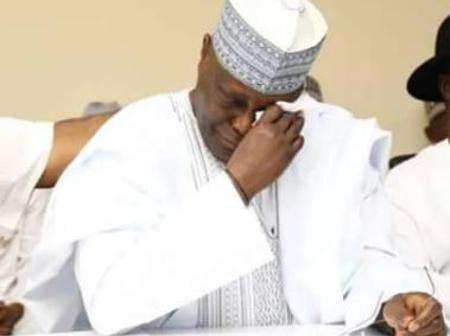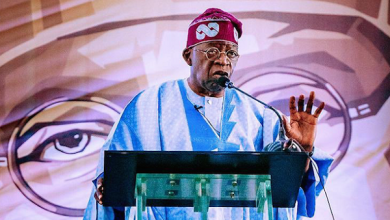2023: Why Atiku is not fit to be president – Malami

The Attorney-General of the Federation (AGF) and the Minister of Justice, Abubakar Malami has said that former Vice President of Nigeria, Atiku Abubakar is not eligible under the Nigeria’s constitution to contest for the presidency.
Malami argued that Atiku, was not been born a Nigerian or by Nigerian parents, and did not meet the provisions of sections 25(1) and (2) 131(a) of the constitution, Atiku would be violating section 118(1)(k) of the Electoral Act should he choose to contest for the post of presidency.
The Incorporated Trustees of the Egalitarian Mission for Africa (EMA) had earlier filed a law suit at the Federal High Court in Abuja against the eligibility of Abubakar Atiku to contest for president. Malami arguments were in support of the law suit.
The EMA has asked the court to hold among others, that considering the provisions of sections 25(1) and (2) and 131(a) of the constitution and the events surrounding his birth, Atiku cannot and should not be allowed to contest for the presidency.
A group of lawyers led by Oladipo Okpeseyi (SAN) have argued that Atiku Abubakar is not a Nigerian by birth.
The law suit marked FHC/ABJ/CS/177/2019 was filed before the 2019 presidential election, it was yet to be heard
Justice Inyang Ekwo mentioned it on March 15 and fixed for hearing on May 4
Malami, the Attorney-General of the Federation said “The first defendant (Atiku) is not qualified to contest to be President of the Federal Republic of Nigeria. The first defendant is not a fit and proper person to be a candidate for election to the office of president of the Federal Republic of Nigeria”.
“The first defendant was born on the 25th of November, 1946 at Jada, at the time in Northern Cameroon. By the plebiscite of 1961, the town of Jada was incorporated into Nigeria”.
“The first defendant is a Nigerian by virtue of the 1961 plebiscite, but not a Nigerian by birth. The first defendant’s parents died before the 1961 plebiscite.”
In his written address, the AGF argued that the effect of the June1, 1961 plebiscite was to have the people of. Northern Cameroon integrated into Nigeria as new citizens of the country, even after Nigeria’s independence.
He added: “This qualified all those born before the 1961 plebiscIte as citizens of Nigeria, but not Nigerian citizen by birth. Consequently, only citizens born after the 1961 plebiscite are citizens of Nigeria by birth”.
He then mentioned provisions of the 1960, 1963, 1979 and 1990 constitutions and noted that ” reasoning of the lawmakers in ensuring that the persons to be President of Nigeria is a citizen of Nigeria by birth is because such a person is the number one citizen and the image of the Nigerian state”.
Malami argued that a person born outside Nigeria before 1960 in a place not a part of Nigeria until June 1 1961 as in the case of Atiku, such a person cannot claim citizenship of Nigeria by birth.
“This is even so where his parents do not belong to any tribe indigenous to Nigeria until their death. The facts of his (Atiku’s) birth on the Cameroonian territory to Cameroonian parents remain unchallenged”.
“At best, the first defendant can only acquire Nigerian citizenship by the 1961 plebiscite. The citizenship qualifications under Section 26 and 27 of the 1999 Constitution of the Federal Republic of Nigeria (1999), by implication, has limited the first defendant’s privileges or rights and cannot be equal or proportional to the privileges of other citizens who acquire their citizenship status by birth”.
” This would include the legal preclusion of the first defendant from contesting for the office of the President of Nigeria”.
Malami argued that the only way Atiku Abubakar could have acquired Nigerian citizenship by birth is under the 1999 constitution where one or both of his parents or grand parents were Nigerian citizens by birth.
He added that “if either of his parents had become Nigerian citizens by virtue of Section 25(1) of the 1999 constitution, which must be in compliance with Sections 26 and 27 of the same constitution”.
“With no concrete proof of compliance, we must submit that the first defendant cannot contest election to the office of the Nigerian President”.
Section 26 and 27 contains obtaining citizenship by registration and naturalisation respectively.
Malami noted that Atiku having contested for the Vice President before now, knowing fully well that he is not a Nigerian has committed offence under Section 118(1)(k) of the Electoral Act
Atiku Abubakar on his part advised the court to dismiss the suit as lacking in merit, he declared that he is ‘a bonafide citizen of the Federal Republic of Nigeria’.
He noted that he had served the country well as Vice President from 1999 to 2017 as well as Governor of Adamawa State and also as Commissioned Officer of the Nigerian Customs Service.
He also noted that both his parents, grand parents and great grand parents were born, lived, died and were buried as Nigerians.
He said the law suit is just to tamper with his person and integrity.




